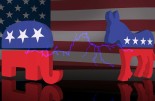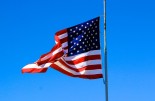Stan Veuger: Trump's unpredictability is a cause for great concern
Stan Veuger: Trump's unpredictability is a cause for great concern

This interview was originally written in Dutch. This is an English translation.
'The economic plans of US President Donald Trump are not only nonsensical, but are also being negotiated in a capricious manner. This is leading to economic chaos and damaging diplomatic relations. The situation is already serious and is likely to deteriorate further, although the current chaos makes it impossible to predict how far this will go.'
By Joost van Mierlo
These are the words of Dutch economist Stan Veuger, who has been working at the American think tank American Enterprise Institute since 2012. In April of this year, he made national news in the United States as one of the two authors of an article that tore apart the tariff war Trump had unleashed a few days earlier.
The reasoning behind the Trump administration's “reciprocal” tariffs had already been dismissed as nonsensical by many. Veuger and his colleague Kevin Corinth made it clear that even if one were to accept the formula used, it had been applied completely incorrectly. If the figures had been processed correctly, the proposed tariffs should have been almost four times lower.
How do you look back on the announcement of those tariffs?
'The announcement of the tariffs in April came as a shock to the rest of the world. In the United States, the shock was less severe. Two months earlier, Trump had already made it clear that he would impose tariffs on Canada and Mexico. These are countries with which the US has had a free trade agreement for over thirty years. As a result, entire sectors, such as the automotive industry, are fully integrated. But Trump suddenly put a stop to that.
On Liberation Day, as the day on which the tariffs were announced was called, the blow was nevertheless greater than expected. The announced tariffs were higher than people had anticipated.'
Apart from the calculation error, what is wrong with the tariffs?
'Criticism quickly followed, not only from academics, but also from people in his own government. In my opinion, you have to distinguish between the content of the tariff plan and the process by which it was announced. The content is based on a fallacy, namely that a trade deficit is the same as a loss. That is, of course, nonsense. There are many good reasons why a country may have a trade deficit with another country.
The process was also very chaotic. The most important economic advisers were not involved in the final decision. When it was decided on the day of implementation that the introduction would be postponed for 90 days, the official US trade representative, who was attending a hearing in Congress at the time, knew nothing about it. You don't see that kind of chaos in other American administrations, not even in the first Trump administration.'
Criticism within his own party will intensify as the midterm elections at the end of next year draw nearer.
Many countries responded to the tariffs in different ways. The United Kingdom quickly pushed for a treaty, while Canada and China took a much more assertive stance. How do you view this and what is the wise course of action?
'Ideally, all of the US's trading partners would form a bloc and say: 'This is not how you behave! We will not negotiate until you reduce all tariffs to their previous levels and simply abide by the rules.'
But that didn't happen. The United Kingdom patted itself on the back as the first country to conclude a trade agreement. According to reports, it was able to do so because Trump was offered an official state visit. China and Canada are examples of countries that took a harder line. It is difficult to say what the wise course of action is. That has mainly to do with Trump's unpredictability. No one can predict what he will do.'
Is that a deliberate strategy?
'I think the real motive behind Trump's negotiations, if you can call them that, is that he doesn't want to lose face. He is, of course, a very vain man who is extremely confident in himself. For most other world leaders, this is less obvious. The most striking example is the introduction of “reciprocal” tariffs, which were lifted again within fourteen hours of coming into effect. The Americans call investment strategies based on this kind of reversal the TACO strategy, where TACO stands for 'Trump Always Chickens Out'.'
That seems to me to be the ultimate form of losing face.
'Yes, it is, but Trump himself presents it time and again as a strategic choice or a groundbreaking new 'deal'.'
In addition to what Trump called Liberation Day, there was also the “Big Beautiful Bill”. What do you think of that?
'It is disappointing legislation in several respects. For the time being, it entrenches huge budget deficits of around 7%, complicates US tax policy with all kinds of new benefits for, for example, employees who receive tips and for senior citizens, and will also lead to a huge expansion of the deportation bureaucracy. Tens of billions will go to new detention facilities and to the ICE investigation service.'
The real motive behind Trump's negotiations is that he does not want to lose face.
The unpredictability of the president of an economic superpower should have economic consequences. However, there is little sign of this. The main stock market indices have recovered since the turmoil following the announcement of the tariffs. How is this possible?
'Shortly after Trump took office, consumer and producer confidence declined significantly. Economic growth has also slowed considerably, from 2.8% last year to 1.2% on an annual basis in the first half of this year. Far fewer jobs are being created, partly due to new immigration restrictions, but also due to trade policy and other factors. Polls now show that Americans are very critical of Trump's economic policy. This is very different from his first term.
There is also some criticism within his own party. I think this criticism will become more intense as the midterm elections at the end of next year approach. If Republicans start to worry about whether they will be re-elected, they will want to distance themselves from Trump.'
For now, Trump is still ruling with an iron fist. This was evident, for example, in the recent dismissal of the chairman of the US Central Bureau of Statistics. How worrying is that?
'It is a very bad sign, one of many in recent months. The only reason for Erika McEntarfer's dismissal was that Trump was dissatisfied with the low number of jobs created in recent months. That is largely due to his own terrible economic policy, but he has decided to blame the messenger.
He has replaced McEntarfer with a completely unsuitable loyalist. There was hope that Trump would choose a reliable person with relevant experience who would not be too partisan. The chosen new administrator, E.J. Antoni, is the opposite of all this. Even people who still have some sympathy for Trump's economic policy think he is unsuitable. The question now is whether he will succeed in manipulating the publication of data on the labour market or inflation.'
I think Trump sees his criticism of Powell primarily as a way to blame someone else when economic results are disappointing.
Trump continues to criticise the independent Federal Reserve, which he believes is far too slow in lowering interest rates. Fed Chairman Jerome Powell in particular is having a tough time. How do you view this?
'The Fed doesn't seem to be too concerned about it. In any case, Powell will remain in office until May next year. Even if Trump were to appoint a different chairman, that doesn't mean the Fed's policy would change immediately. The chairman has only one vote on the committee that decides on interest rate changes. It is an important vote, but the majority decides.
I personally think that Trump sees his criticism of Powell primarily as a way to blame someone else if the economic results are disappointing. From that perspective, Powell's presence may suit him very well and he may not need to leave at all.'
Internationally, Trump seems to have more sympathy for aggressors such as Russia and, in a sense, Israel. What does this mean for Taiwan?
'There are American voices claiming that Trump wants to settle the war in Ukraine with a favourable deal for Putin, so that he can focus his attention entirely on China. I don't find that very credible. Why would Taiwan think that the United States will help them if it abandons Ukraine?
It's a very difficult question. Personally, I think it's unlikely that Trump will send American troops to Taiwan, a country that the United States has not even officially recognised. But it's possible that he would see failing to do so as a loss of face. And that, of course, must be prevented.
It remains an unclear issue for me. The battle for Taiwan will probably start with a naval blockade. I cannot see American ships attacking Chinese ships. But there is also a scenario possible similar to when the British signed a treaty on Hong Kong. Our best hope is that the status quo will survive Trump's term in office.'
In conclusion, what do you see as the highs and lows of more than six months of Trump?
'The lows are mainly the domestic attacks on the rule of law. Think of the way he has put pressure on law firms and universities and the abduction of immigrants. That is all highly questionable. The high point, in my opinion, is that he withdrew the tariffs he announced within fourteen hours of them coming into effect. But of course, that is actually also a low point.'
|
Stan Veuger Stan Veuger studied Business Administration at Erasmus University in Rotterdam and Spanish Language and Literature at Utrecht University. He obtained his PhD from Harvard University in 2012. He has been working for the American Enterprise Institute in Washington since 2012. Veuger co-authored the book Economic Freedom and Human Flourishing with Michael Strain in 2016. In recent years, he has taught at Harvard University, among other institutions, and is a sought-after commentator in American media outlets such as CNN and The New York Times. |









